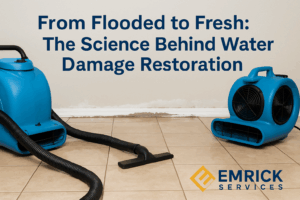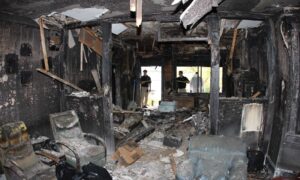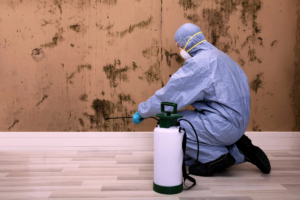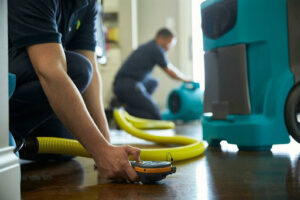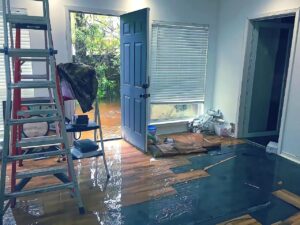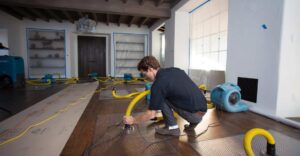Fire damage is a serious matter that can have a major impact on your property, your personal safety, and your financial well-being. Whether it’s a small kitchen fire or a larger-scale disaster, the severity of fire damage can be devastating.
When fire strikes, it can cause significant damage to your property, including structural damage, smoke damage, and damage from water used to extinguish the fire. Not only does this affect the physical integrity of your property, it can also lead to the loss of valuable belongings and possessions. In addition to property damage, there are also personal safety risks to consider, such as the potential for injuries and long-term health effects from smoke inhalation.
It’s important to understand the severity and impact of fire damage to properly prepare for and prevent the devastating effects it can have on your life. So, what damage can a fire cause? Read on to explore the different types of fire damage and how to mitigate its risks.
Key Takeaways:
- Fire damage can cause structural damage, smoke damage, and water damage from firefighting efforts to your property.
- Fires pose personal safety risks, including the risk of injuries and long-term health effects from smoke inhalation.
- Understanding the severity and impact of fire damage is crucial for preparedness and prevention.
- By recognizing the types of damage, prioritizing personal safety, and taking necessary steps for mitigation and restoration, you can better protect yourself and your property.
- Fire damage restoration involves a thorough cleanup and repair process, which is best left in the hands of professionals.
Types of Fire Damage
There are several types of damage that can occur as a result of a fire:
| Types of Fire Damage | Description |
|---|---|
| Structural Damage | This type of damage occurs when the fire weakens or destroys the structure of a building, compromising its stability and safety. |
| Smoke Damage | Smoke from a fire can penetrate walls, ceilings, and floors, leaving behind soot and an unpleasant odor. It can also damage electronics, furniture, and other valuable items. |
| Water Damage | Water damage can occur as a result of firefighting efforts to extinguish the flames. It can lead to structural damage, mold growth, and other issues that may require professional restoration services. |
In addition to these types of fire damage, there may be other secondary damage caused by smoke or flames. It is crucial to assess the extent of the damage and take appropriate action to mitigate it.
Remember: The key to minimizing the impact of fire damage is to act quickly and seek professional assistance to restore your property to its pre-loss condition.
Property Damage from Fires
Fires can cause extensive damage to your property, leaving you with significant repair or rebuilding costs. The destruction of buildings, loss of belongings, and severe structural damage are all common consequences of fire damage.
According to the National Fire Protection Association, in 2019, there were approximately 1.3 million fires reported in the United States, resulting in $14.8 billion in property damage.
The impact of fire damage on your property can be devastating, including the loss of sentimental and valuable possessions, damage to important documents, and potentially leaving you without a home until the repairs are complete.
In addition to the visible damage, there may also be hidden damage, such as water damage from firefighting efforts or smoke damage affecting the air quality of your home. It is crucial to hire professionals to assess the damage and provide a comprehensive restoration plan to ensure your property is safe and livable again.
Personal Safety Risks
Fires can pose significant risks to personal safety. In addition to the potential for injuries or fatalities resulting from a fire, the long-term health effects of smoke inhalation can be severe. Exposure to smoke can cause respiratory issues, heart disease, and cancer, among other health problems. Therefore, it is essential to prioritize personal safety during a fire and take necessary precautions to minimize these risks.
One effective way to reduce your risk of smoke inhalation is to stay low to the ground, as smoke tends to rise. Additionally, it is essential to ensure that working smoke detectors are installed throughout your home and to test and replace the batteries regularly. If a fire does occur, having an emergency evacuation plan in place can help prevent injuries and fatalities.
Financial Consequences
In the aftermath of a fire, the financial consequences can be devastating. Rebuilding or repairing property can be costly, and the value of possessions lost in the fire can add up quickly. Fire damage does not only affect physical items, but it can also cause a disruption of business operations, leading to a loss of income.
Depending on the circumstances, insurance may cover some or all of the costs associated with fire damage. However, it is important to note that not all insurance policies are the same, and it is crucial to understand the terms of your policy before a fire occurs. If you are unsure about your insurance coverage, speak with your insurance provider to clarify what is and is not covered.
| Costs of Fire Damage | Estimated Cost |
|---|---|
| Structural Damage | $50,000+ |
| Smoke Damage | $5,000-$20,000 |
| Water Damage | $2,000-$10,000 |
| Replacing Personal Property | $2,000-$10,000+ |
As you can see from the table above, the costs associated with fire damage can quickly add up. It is important to take steps to prevent fires from occurring and to have a plan in place in case a fire does occur.
By being proactive and taking steps to mitigate fire risks, you can reduce the likelihood of experiencing a fire and the financial consequences that come with it.
Mitigating Fire Risks
Fires can wreak havoc on your property, your personal safety, and your financial well-being, but there are steps you can take to mitigate the risk of fire damage. By implementing fire safety measures, conducting regular inspections, and creating an emergency evacuation plan, you can help protect yourself and your property from the devastating consequences of fires.
Here are some practical tips for mitigating fire risks:
| Tip | Description |
|---|---|
| Install Smoke Detectors | Smoke detectors are essential for detecting fires early on. Make sure to install smoke detectors on every level of your home and test them regularly. |
| Keep Flammable Objects Away from Heat Sources | Be mindful of where you place flammable objects in your home. Keep them away from heat sources like stoves, candles, and space heaters. |
| Use Caution with Flames | Never leave open flames unattended and be cautious when using candles, matches, or lighters. Keep them away from children and flammable objects. |
| Keep a Fire Extinguisher on Hand | Having a fire extinguisher on hand can help you put out small fires before they become too big to handle. |
| Conduct Regular Inspections | Regularly inspect your home for potential fire hazards, such as frayed wires, overloaded outlets, and damaged appliances. |
| Create an Emergency Evacuation Plan | Make sure every member of your household knows how to get out of the house quickly and safely in the event of a fire. Designate a meeting spot outside your home where everyone can gather. |
By taking these steps to mitigate fire risks, you can help protect your property, your personal safety, and your financial well-being from the devastating consequences of fires.
Fire Damage Restoration
Fire damage restoration is a crucial step in recovering from the devastating impact of a fire. It involves thorough cleanup, repair, and restoration to return your property to its pre-fire condition. The restoration process begins with removing debris and assessing the extent of the damage to determine the required repairs.
Cleaning up after a fire is not an easy task and can be dangerous if not done correctly. Smoke and soot residue can be harmful, and firefighting efforts can leave standing water, which can lead to mold and other issues. Additionally, fires can cause unseen structural damage, which can be hazardous if not addressed promptly.
It is important to hire professionals experienced in fire damage restoration to ensure efficient and safe cleanup and repair. They have the necessary equipment, knowledge, and skills to handle the job and mitigate further damage or risks. A professional restoration company can also work with your insurance provider to ensure that your claim is filed correctly and that you receive the maximum possible compensation for your loss.
Overall, fire damage restoration is essential to getting your life back on track after experiencing a fire. It helps to minimize the financial burden, restore your property, and provide peace of mind knowing that professionals have taken care of the extensive work required.
Conclusion
Fire damage is a serious matter that can have a devastating impact on your property, personal safety, and financial well-being. By understanding the different types of damage that can occur, you can be better prepared to protect yourself and your assets.
It is crucial to prioritize personal safety in the event of a fire. Knowing how to evacuate quickly and safely can mean the difference between life and death. Additionally, taking steps to mitigate fire risks, such as conducting regular inspections and implementing fire safety measures, can go a long way in preventing fires from occurring in the first place.
If you do experience fire damage, restoration is key. Hiring professionals for efficient and safe restoration can help ensure that your property is restored as quickly and thoroughly as possible, minimizing financial losses.
In conclusion, being aware of the severity and impact of fire damage is crucial for taking necessary precautions, minimizing potential losses, and protecting yourself, your property, and your financial well-being from the devastating consequences of fires.
FAQ
What is fire damage severity?
Fire damage severity refers to the extent or degree of damage caused by a fire. It can range from minor damage to complete destruction, depending on factors such as the size and intensity of the fire and the materials involved.
How does fire damage impact property?
Fire damage can have a significant impact on property, including the destruction of buildings, the loss of belongings, and the potential for severe structural damage. It can lead to the need for extensive repairs or rebuilding and can result in a substantial financial burden.
What are the types of fire damage?
The types of fire damage include structural damage, smoke damage, and water damage from firefighting efforts. Structural damage refers to the damage to the physical structure of a building, while smoke damage and water damage can affect both the structure and the contents of a property.
What are the personal safety risks associated with fires?
Fires pose various personal safety risks, including the potential for injuries or fatalities. The heat, flames, smoke, and toxic gases released during a fire can cause burns, respiratory problems, and other health issues. Long-term health effects from smoke inhalation are also a concern.
What are the financial consequences of fire damage?
Fire damage can result in significant financial consequences. These may include the costs of rebuilding or repairing property, the loss of valuable possessions, and potential insurance considerations. The financial impact can be overwhelming and may require extensive financial resources for recovery.
How can fire risks be mitigated?
Fire risks can be mitigated by implementing fire safety measures such as installing smoke detectors and fire extinguishers, conducting regular inspections of electrical systems and appliances, and creating an emergency evacuation plan. It is important to be proactive in identifying and addressing potential fire hazards.
What is involved in fire damage restoration?
Fire damage restoration involves the cleanup and repair process following a fire. It typically includes removing debris, cleaning and sanitizing affected areas, drying and dehumidifying, and restoring or replacing damaged materials. It is crucial to hire professionals who specialize in fire damage restoration for efficient and safe restoration.



